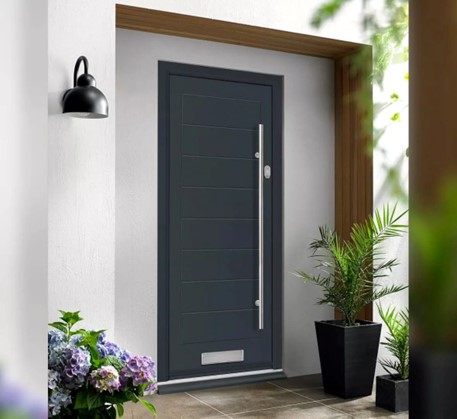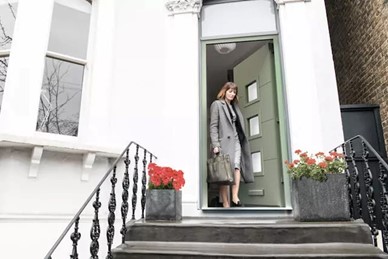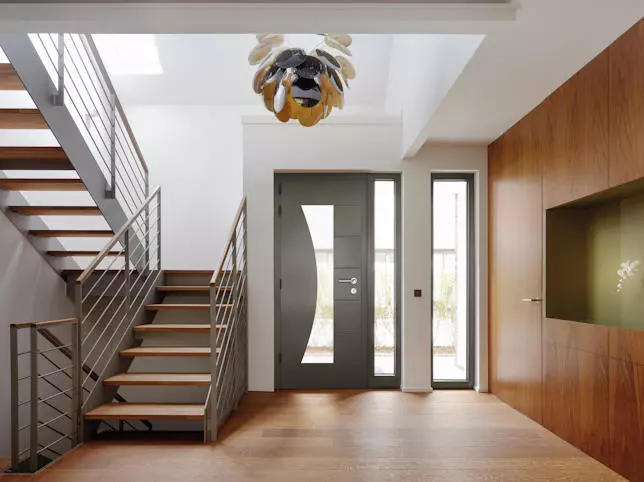Choosing the most secure front doors and the best hardware for your home
Not only is it important for your front door to be aesthetically pleasing, but it’s also extremely important that it maintains the security of your home. Most burglars gain access to a house through the front door, making it imperative that homeowners invest in a strong and dependable entrance.
Here, we take you through how to choose the most secure front door, and security features to look for.
In this guide:
Learn more about choosing the best security locks for your front door.
Find out more about the best type high-security door including the materials and other factors to consider.
Find out more about choosing the most secure door handles for your front door, including the types available.
Learn more about the steps you can take to improve the security of your front door.
We answer common queries on choosing secure front doors.
THE BEST SECURITY LOCKS FOR YOUR FRONT DOOR
When buying a new front door, not only should you look for a material and glazing option that will keep the door as secure as possible - you will also need to research the best type of lock to ensure that intruders are unable to snap or break it to gain entry to your home.
Types of lock available include:
-
5 lever mortice deadlock and lever lock – this type of lock is commonly fitted to a wooden front door and can be locked from the inside and the outside. It’s fitted into the door instead of on the surface. come in three and five lever options (the higher the number of levers, the more secure the door is) and provides a good level of security. Many insurers specify a five-lever lock as standard.
-
Multi-point locking system – can be used with any entry door and is always operated using a key. This is one of the most secure locking systems you can buy. Most multi point locks are also combined using a key operated euro cylinder, and some with an optional internal thumb turn cylinder.
-
Rim lock or night latch – placed on the door’s surface and locks automatically when you close the door but you will need an additional lock to ensure complete security.
The door lock you choose will depend on a number of factors so these should all be carefully considered when choosing both the type of front door you install in your home and the locks you choose. When buying a lock for your front door, consider:
-
The material of the door. Find out more about different door materials here.
-
The security standards you want to meet
-
Your home insurance requirements.
Checking your home insurance policy to find out whether a specific type of door lock is specified will have a huge impact on the lock you’ll need for your front door. Remember that if you don’t have the correct door lock and your home is broken into, you may not have full protection from your insurance policy.
Read our guide to choosing the best security locks for a front door here.
WHICH TYPE OF FRONT DOOR IS BEST FOR SECURITY?
When choosing a new front door for your home, one of the biggest factors in deciding on the right door for you will be the security it can offer to your home. The look and material of your front door alone can be a deterrent to potential intruders who want to gain access to your home as quickly as possible without being detected.
So, what should you be looking for in a front door in terms of security?
Factors to consider include:
-
Material and door style
-
The door lock fitted or available with the door
-
Accreditations or certifications.
Each material and style of door will have its own strengths and weaknesses in terms of security, so it’s important to carefully consider and understand your options before making a final decision.
Are you choosing a new aluminium front door? Find out how to choose the right aluminium front door here.
CHOOSING TYPES OF FRONT DOOR MATERIALS
Let’s have a look at the different door materials available and their security:
Wooden front doors
Wooden entrance doors offer a sturdy and long-lasting solution for any home and a solid door that will be hard for any intruder to break into.
Pros:
-
Long-lasting
-
Sturdy and durable
-
Aesthetically pleasing
-
Variety of locks can be fitted for wooden doors.
Cons:
-
Require more maintenance than other doors to maintain their longevity
-
Timber door frame material must be a high-quality wood to offer security.
Shop our full range of wooden front doors here.
uPVC front doors
uPVC front doors have been popular for a number of years due to their versatility and low maintenance.
Pros:
-
Cheaper than other door materials but maintain security
-
High manufacturing standards now provide security
-
Can be customised to suit your home and needs.
Cons:
-
Can degrade after a number of years which means security is also compromised
-
Can only be fitted with the lock fitted upon installation.
Find out how uPVC compares to composite here.
Composite front doors
Composite front doors look to address the problems and weaknesses found in other types of external door.
Pros:
-
Can withstand huge amounts of force
-
Extremely secure
-
A composite door can be customised to suit your home
-
Needs very little maintenance.
Cons:
-
One of the most expensive doors on the market.
Shop our full range of composite front doors here.
LOOKING FOR A COMPOSITE GREY TRADITIONAL FRONT DOOR?
Our Pick:
CARNOUSTIE COMPOSITE FRONT DOORS
FROM £969

These stylish Carnoustie traditional composite front doors are available in a range of standard sizes with and without side lights there really is something for every home. They offer high-definition GRP skin, use a high performance LVLF core, and a full range of accessories available to complete the look. Carnoustie front doors also offer a U value of 1.4 W/m2K and strong laminated security glass.
Aluminium front doors
Aluminium front doors are made from solid and sturdy aluminium. They are usually constructed using aluminium sheets with a thermal insulation material often made from plastic. The doors also use an aluminium thermal frame to help keep your home energy efficient and use either stainless steel or aluminium handles. Read more about the different front door materials here.
Pros of aluminium front doors
-
Excellent thermal efficiency – modern aluminium doors often offer better thermal efficiency than wooden or uPVC front doors which means your home will not suffer from as much heat loss during the winter months, helping to save on energy costs.
-
Lightweight – aluminium front doors are perfect if you’re looking for a lightweight door that’s easy to open and close.
-
Low maintenance – these doors are a low maintenance option, so the initial high cost is offset by the fact that you don’t need to pay much to keep your door looking great and ensure it lasts for many years. Read our guide to maintaining front doors.
-
Large doors available – aluminium doors can be made larger than other doors, which work best for larger entrances. An aluminium entrance door can add to the overall look of your home.
-
Match other windows and doors – aluminium windows and aluminium bifold doors are becoming extremely popular with homeowners so an aluminium door can match any existing windows and doors in your home.
Cons of aluminium front doors
-
Expensive – aluminium front doors are much more expensive than another other type of entrance door you choose for your home but have similar benefits to composite doors which come with a lower price tag.
-
Can become stained – whilst powder coating offers long term protection for aluminium doors, it can become stained if left uncleaned for long periods. So, if your front door is more exposed, they can become marked over time. This will not cause the doors to rust or degrade but can affect the kerb appeal of your home.
In addition to the material of your front door, there are also a number of other factors to consider to ensure security, including:
-
A reputable supplier
-
Locks
-
Home insurance policy.
Read more about choosing the best front door security for your home.
EXPERT QUOTE:
"Aluminium as a material will comfortably outlast uPVC, which has a lifespan of only 20 to 30 years."
-Rick Collins, Director, Vufold
Vufold’s Signature Front Door range

Offering style, security and great value, our signature aluminium front doors are designed for the modern family. Virtually maintenance free, thermally efficient, and available in a range of styles and designs to suit any home.
Read how choosing a secure front door can help to increase your property value.
HOW TO CHOOSE THE BEST HANDLE FOR YOUR FRONT DOOR
Selecting a handle for your front door may seem like a simple task; however, to ensure complete security for your home, the functionality and security it provides will also be important to consider.
The main factors to consider when choosing the best front door handle for your home are:
-
Aesthetics – your door handle should fit in with the overall look and style of your home and front door.
-
Functionality – consider how the door handle will be used and whether it’s the right choice for your front door. You need something that allows you easy access to your front door without jamming or sticking.
-
Security – your front door handle should offer a sturdy solution that will prevent intruders from being able to easily break or snap it to gain access to your home.
TYPES OF DOOR HANDLE
There are a number of types of door handle to consider, each with its own benefits:
Lever handles
These are the most popular option and come in a range of styles. However, they will need to be locked when you leave your home as they do not lock automatically when you close the door.
Door knobs
Door knobs offer a great security barrier against intruders but, as there is no lever, you will require a key to get in and out of your home and to make sure your home is secure when you go out. This is a traditional type of door handle that is commonly found on timber doors with a mortice deadlock and night latch installed.
Long bar handle
Long bar handles provide extra decoration for your front door and make it easy to push or pull the door open and closed. They are commonly used in conjunction with multi point auto locks or otherwise referred to as slam shut locks.
Read how to choose the best handle for a front door here.
Making sure that your front door is as secure as possible will help to keep your home safe from intruders and reduce the chances of anyone being able to gain access. The majority of home robberies occur when intruders gain access through a front door that’s weak. It’s the easiest point of access to your home so, making sure you put as many measures in place as possible will make a significant difference.
So, what should you do to help improve the security of your front door?
Choose a high-quality door lock
Choosing the right lock for your door will go a long way towards improving home security and preventing people from gaining access to your home. Read our full guide to choosing front door locks here.
Consider reinforcements for your door
Common reinforcements for your front door include a deadbolt, door chain, hinge and screw reinforcements and a high-quality door handle.
Strike plate
A strike plate can improve security by reinforcing the door jamb which is an area prone to weakening.
Replace or repair hinges
Weak hinges can allow intruders to gain access so checking them frequently and providing any maintenance will help to keep them in the best condition.
Alter letterbox
Letterboxes can provide access to your home so extra precautions such as a draught excluder can make it more difficult for thieves to gain access.
Peepholes
Installing a peephole will allow you to see who’s at the door and decide whether or not you want to open it.
Glazing
Double and triple glazing can make it more difficult for an intruder to gain access and makes it much more difficult for them to force entry. Read our guide to choosing a thermally efficient front door here.
Replace your front door
Unfortunately, if you have an older front door, the best solution for security may be to replace it completely. Seeing an old, run-down front door can be a signal to thieves that your house will be easy to gain access to.
Repair or replace your door handles
Door handles can have an impact on the security of your home so making sure they’re in good condition will help to improve the security of your front door. Find out more about repairing or installing new door handles in our guides.
Read our full guide to door security and hardware here.
Frequently asked questions
What is the best lock for a wooden door?
When it comes to locking systems for wooden doors, there is some flexibility in the lock you choose. A night latch, mortice deadlock or mortice sash lock are all suitable options. Your lock should always conform to British Standard BS3621.
How important is the door material for security?
The material of your front door plays a significant role in its security. Strong materials such as aluminium and composite doors offer high resistance to forced entry and environmental damage.
Why are high-quality locks important for front door security?
A good lock for your front door is vital for security as it’s the best way to secure your home against intruders. Strong and reliable locks are a major deterrent for would-be intruders because doors are a common point of entry for criminals who are breaking and entering. Figures from the ONS showed that 76% of domestic burglaries in the UK were accessed through an exterior door.
What is the most secure lock to prevent lock snapping?
A Euro cylinder lock, with a 3 star security rating or above, is generally thought of as the best option for preventing lock snapping. They’re designed and tested to stand up against this type of attack.
To find out more about choosing the best lock for your front door, please contact our expert team today.
Read our tips on making your door more secure here.
RELATED CONTENT

About Amanda Hewer
Having been at Vufold for around 12 years now, Amanda became operations manager after spending time in Customer Service, Sales, Order Processing and our Warehouse. Amanda likes that no two days are ever the same and believes her successful career stems from her keen interest in people, helping them achieve their goals and striving for constant improvement across all departments.
Read more about Amanda Hewer





